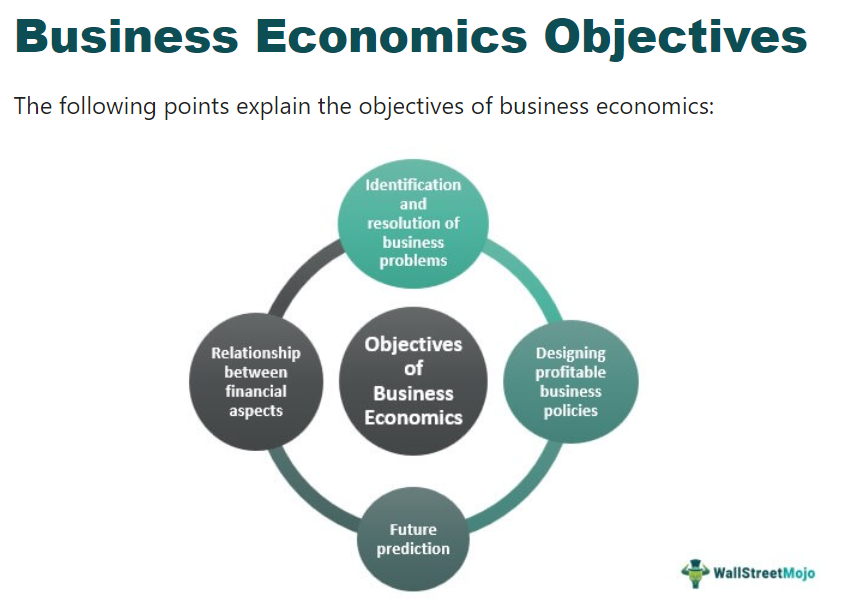Exploring How Business and Economics Shape Consumer Behavior
Exploring How Business and Economics Shape Consumer Behavior
Blog Article
Comprehending Economic Principles for Better Company Decision-Making
In the complex landscape of modern-day business, an extensive understanding of economic principles can significantly enhance decision-making processes. By examining aspects such as market frameworks and customer habits, organizations can customize their approaches to align with affordable dynamics and customer needs. In addition, understandings into demand elasticity and opportunity expenses provide a framework for enhancing resource allotment. The application of these economic concepts typically exposes unexpected challenges and opportunities that can redefine strategic techniques. What implications do these understandings hold for the future of organization method?
The Fundamentals of Economic Concept
Economic theory works as the structure for comprehending exactly how individuals and companies make choices in the presence of scarcity. At its core, financial concept takes a look at the allowance of limited resources to satisfy unlimited wants. This fundamental principle of scarcity necessitates compromises, engaging decision-makers to examine the benefits and prices associated with numerous alternatives.
Both key branches of economic concept are macroeconomics and microeconomics. Microeconomics concentrates on private agents, such as customers and firms, analyzing their actions and communications in particular markets. It highlights principles like supply and demand, rate flexibility, and market stability, which are critical for understanding just how costs are identified and how resources are distributed.
Conversely, macroeconomics checks out the economy overall, addressing more comprehensive concerns such as rising cost of living, joblessness, and financial development. It provides understandings right into systemic sensations that affect all financial representatives, guiding policymakers in crafting reliable financial strategies.
Ultimately, a solid grounding in economic concept is vital for effective business decision-making. By recognizing the concepts of scarcity, trade-offs, and market dynamics, organizations can better make and navigate complex environments informed options that improve their affordable advantage.
Key Economic Indicators
Trick economic signs function as important tools for evaluating the wellness and instructions of an economy, providing useful insights for organization decision-making. These indications are quantitative measures that mirror the economic performance and can be categorized right into leading, delaying, and coincident indicators.
Leading indications, such as consumer confidence indexes and securities market patterns, predict future financial activity, enabling organizations to anticipate adjustments in the marketplace. Delaying signs, like unemployment rates and company earnings, provide understandings right into the economic situation's past efficiency, assisting businesses to evaluate lasting patterns. Coincident signs, such as GDP development and retail sales, change concurrently with the economic climate, providing a real-time picture of financial problems.
Comprehending these indicators allows businesses to make educated decisions relating to financial investments, source allocation, and critical preparation. An increase in consumer confidence might motivate business to increase production in anticipation of higher need. Alternatively, rising unemployment prices might result in a reevaluation of expansion plans. By very closely keeping an eye on these crucial financial signs, services can navigate unpredictabilities and position themselves effectively in the ever-changing economic landscape, ultimately improving their decision-making processes and long-term success.

Market Frameworks and Characteristics
Comprehending market structures and characteristics is crucial for organizations intending to prosper in competitive environments. Market frameworks, generally classified right into excellent competition, monopolistic competition, oligopoly, and monopoly, significantly influence prices methods, item differentiation, and affordable behavior. Each structure offers unique challenges and chances that can dictate a firm's tactical direction.
Oligopolies, identified by a few leading players, lead to interdependent decision-making; companies should meticulously consider competitors' actions to their activities. Syndicates exist when a solitary firm controls the market, resulting in maximum pricing power but frequently bring in regulatory analysis.
Understanding these characteristics enables services to anticipate market fads, adapt methods, and maximize resource allowance. Furthermore, acknowledging exactly how external variables like innovation and law impact these frameworks can improve calculated preparation. By understanding market frameworks and dynamics, companies can make enlightened decisions, ultimately improving their competitive placement and driving sustainable development.
Customer Actions Insights
Customer behavior plays a crucial function fit organization methods and results. Recognizing just how customers make buying decisions, their choices, and the elements influencing their behavior can significantly enhance a firm's ability to fulfill market needs. Key insights right into consumer behavior can be stemmed from assessing demographics, psychographics, and behavioral patterns.
Market aspects such as age, earnings, education and learning, and sex degree offer a foundational understanding of target markets. Psychographics delve deeper, discovering consumers' way of lives, attitudes, and worths, which can influence brand commitment and product perception. Behavior insights, such as acquiring regularity and feedback to promotions, are important for customizing marketing initiatives.
Furthermore, outside elements like economic problems, social fads, and technological advancements also affect consumer choices. For circumstances, throughout economic downturns, consumers might prioritize necessary products over luxury items, altering need patterns.
Applying Economics to Approach
Insights gained from consumer behavior are crucial in developing efficient service techniques. By leveraging financial concepts, businesses can better recognize market characteristics, optimize resource allocation, and improve competitive placing. Assessing demand flexibility, as an example, makes it possible for firms to change rates methods to make best use of profits while remaining eye-catching to consumers.
In addition, understanding market division allows companies to tailor their offerings, ensuring they satisfy the certain requirements and choices of varied consumer teams. Business and Economics. This targeted strategy check that boosts consumer complete satisfaction and fosters brand name commitment

Including game theory into calculated preparation also offers understandings into affordable behavior, allowing firms to anticipate competing actions and design counter-strategies efficiently.

Conclusion
Finally, a thorough understanding of economic concepts dramatically boosts business decision-making. By taking a look at market structures, evaluating consumer behavior, and analyzing key financial indications, companies can develop effective strategies that align with market demands. The application of concepts such as demand flexibility and chance prices additionally aids in optimizing resource allotment and investment decisions. Ultimately, integrating these economic theories promotes improved strategic choices, facilitating far better expectancy of market patterns and competitive activities, thereby driving success.
In the facility landscape of modern-day company, an extensive understanding of financial concepts can significantly boost decision-making processes.Leading indications, such as customer confidence indexes and supply market trends, forecast future economic activity, allowing services to anticipate modifications in the market. check my site By very closely keeping track of these key financial indications, businesses can navigate uncertainties and position themselves efficiently in the ever-changing economic landscape, eventually enhancing their decision-making procedures and lasting success.
By leveraging economic concepts, services can much better comprehend market dynamics, optimize resource allocation, and enhance competitive positioning.In verdict, a thorough understanding of financial concepts significantly boosts company decision-making.
Report this page